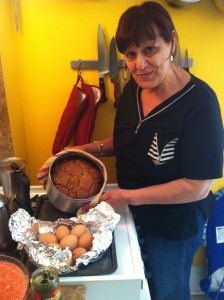
On Friday night, the night of the National Magazine Awards gala in Toronto, I was sitting at home in my PJ’s following the Twitter feed, waiting to hear if the piece I wrote about my mother, ‘Yemeni Soup and Other Recipes,’ won in the One of a Kind category.
It was past my bedtime, because now that I’m a mother I can’t waste precious sleeping hours when my baby is sleeping. I kept refreshing the feed, looked at photos that other people tweeted showing beautiful people in glamorous outfits, read their tweets about a chocolate fountain, and imagined how much fun it would have been to actually attend. Eventually I gave up and told Sean I was going to turn in and check tomorrow when someone tweeted “Congratulations to Ayelet Tsabari for winning silver!”
Holy shit, I thought. And then: I need to call my mom.
I wrote Yemeni Soup a couple of years ago and for a long time couldn’t place it. Once, it was shortlisted to a contest. Twice it was rejected: no note. When Grain finally picked it up, after the initial joy of receiving an acceptance email from a magazine, I became nervous. It was a very personal piece, about my mother and our relationship. When I was writing it I wasn’t really thinking of it being published: I often don’t in the early stages. Even when I shopped it around the idea of it being in print was still intangible. Now it was going to be printed and bound and sold in stores. In a literary magazine, mind you, which doesn’t have a huge readership, but still. What would my mother say? Then I reminded myself that my mother doesn’t read English (no more than signs and headlines, anyway). Maybe she doesn’t have to know. And so I didn’t tell her.
When I came to Israel last fall I was determined to come clean. I brought an issue of the magazine to show her. But then three and a half months flew by and I never did. The day I was flying back I left the issue with my sister. She read it, loved it. She also thought I should show it to my mother.
“What are you so worried about?” Sean said. “It’s such a loving piece.”
Of course it is. But still, I did mention rougher times, our quarrels and disagreements during my teenage years, her struggles after my father’s passing. What if it pissed her off? Hurt her feelings? What if she didn’t like how I portrayed her? What if she didn’t remember it the same way? With my nonfiction students at U of T I often talk about the challenges of writing about our loved ones. It’s a tricky thing, I tell them with a sympathetic nod, offering no real solution, and a part of me feels like a fraud. Because unlike most of my students, I have the (dubious) advantage of living across the world from my family, of writing about them in a different language. Then I tell them about Yemeni Soup, confess—eyes lowered— that despite the buffer of language and distance, I still couldn’t bring myself to tell my mother. I tell them I find comfort in a phone conversation my mother and I once had. I confided in her that I was anxious about publishing my nonfiction, afraid people in the family would disapprove of how I depicted them, of how I chose to tell our story.
“Nonsense,” my mother said. “You won’t be able to write anything if you think like that.”
There it was, I thought: her permission.
And still, I didn’t tell her.
I found out about the nomination while my mother was in town. My mother is never in town. She’s visited me only once before in the fifteen years I live in Canada. Now, she flew across the world to spend a couple weeks with me and my new baby after the birth. It was a wonderful and intimate time. I loved having her here. One night, after a meal of schnitzel and mashed potatoes that she prepared for us (as expected she filled our freezer with everything I love: malawach, jichnoon, schnitzel, bisbas) I finally told her. It seemed significant, poetic even, that I found out about the nomination while she was in town, weeks after I became a mother myself, around Mother’s Day of all days. “An award?” she said, eyes wide, “about me?” and then, “That’s great!” She didn’t ask for more details but I could tell that she was a little suspicious.
I called yesterday and told her it won. She was pleased, proud. Then she demanded, “I need to read it! I need to know what you wrote about me!” and laughed. She repeated the news to her friends whom she was playing cards with. I could hear their mumbled responses.
Today, I put the magazine in an envelope and mailed it to her, along with a photo of her, me and my daughter, taken by Sean on Mother’s Day in our Toronto kitchen. She may not be able to read the piece and I doubt my siblings would have the time to translate it, but maybe next time I’m in Israel we can sit in her sunny kitchen, which would probably smell of cake, or tsli, or roasted eggplant, and I will translate it to her word to word: no matter how long it takes. I hope that she sees what others see, that it is, like Sean said, a loving piece. Or she might yell at me for a bit, but that I can handle.
